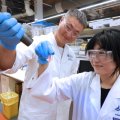
Cutting-edge research that aims to stop the transformation of healthy cells into cancerous cells is one of nine prestigious grants and scholarships awarded to health and medical researchers at The University of Queensland (UQ).
The $8.3 million awarded to UQ from the National Health and Medical Research Council (NHMRC) will support the University and its Institutes in conducting world-leading medical research.
The grants were among $114 million in funding announced by the Australian Government today, with UQ receiving one program grant, the two development grants awarded to Queensland, and six postgraduate scholarships.
UQ projects include; use of snake venom to improve blood sampling in patients on anti-clotting medication, developing a new asthma treatment, improving treatments for pleural disease, developing early-testing for pre-eclampsia, studying golden staph infections of the heart, analysing the impact of iron on chronic airway infections in cystic fibrosis patients, preventing lung damage from prolonged bronchitis in children, and new rehabilitation techniques for children with congenital hemiplegia (a form of cerebral palsy).
Professor Robert Parton led a team that included Professors Alpha Yap and Kirill Alexandrov (all from UQ’s Institute for Molecular Bioscience) that was awarded a prestigious NHMRC Program Grant of $7.1 million for research into cell surface changes in cancer, immunity, and muscular dystrophy.
Their research will study how the cell surface is organised into domains such as caveolae and how junctions between cells form and function.
“The cell surface is organised into domains with distinct functions. Caveolae, which are shaped like flasks, are thought to help transmit signals to the cell interior and protect the cells against stress,” Professor Parton said.
“Defective caveole are associated with cancer, muscular dystrophy, and cardiac disease.
“Other specialised domains hold cells together and contribute to immunity. Defects in these domains occur in cancer and inflammation.
“Our goal is to study these domains, identify their important components, and understand how they form and function, which will have huge importance for therapeutic strategies.”
UQ Deputy Vice-Chancellor (Research), Professor Max Lu, congratulated all the UQ recipients of the NHMRC grants announced today.
“UQ has some of the most innovative and successful medical and health researchers in the world and today’s announcement is acknowledgment of the high quality and vital work they are doing to further human health,” Professor Lu said.
“It is particularly pleasing to see that six of the grant recipients were UQ postgraduate researchers. These dedicated and talented early career researchers herald a bright future for breakthrough medical and health research in Australia.”
NHMRC grants awarded to UQ researchers today, are;
NHMRC Programs Grants
Professor Robert Parton, Professor Alpha Yap and Professor Kirill Alexandrov, all from the Institute for Molecular Bioscience, and Katharina Gaus, UNSW, ($7,100,605)
Program in Membrane Interface Biology.
This research program aims to gain a detailed understanding of the organisation of the cell surface at the molecular level. The cell surface is organised into domains with distinct functions. Visualisation of these domains, identifying their important components, and understanding how they form and function will have huge importance for therapeutic strategies aimed at combatting the changes associated with cell transformation in cancer and in other human diseases such as muscular dystrophy.
NHMRC Development Grants
Professor Martin Lavin (lead), UQ Centre for Clinical Research, Dr Paul Masci, School of Medicine, Emeritus Professor John de Jersey, School of Chemistry and Molecular Biosciences, and Mr Goce Dimeski, School of Medicine, ($277,450)
Use of snake venom prothrombin activators in blood collection tubes to produce high quality serum to improve patient outcomes.
The timely availability of high quality serum and plasma samples are of the utmost importance for accurate biochemical analysis in a clinical setting. This requirement is particularly true for patients on anti-clotting therapeutic agents such as warfarin and heparin. This study will employ potent prothrombin activators purified from snake venom to enhance the clotting efficiency of blood for serum preparation for biochemical analysis.
Associate Professor Mark Smythe (lead), Institute for Molecular Bioscience, Dr Simon Phipps, School of Biomedical Sciences, and Dr Jack Flanagan, University of Auckland, ($417,340)
The development of human hematopoietic prostaglandin D2 synthase inhibitors in allergic asthma and related disorders.
Prostaglandin D2 (PGD2) is a key mediator of asthma and allergic rhinitis. Dr Smythe’s team has developed drug-like compounds that block the synthesis of PGD2 by inhibiting the hematopoietic prostaglandin D2 synthase (HPGD2S) enzyme. This project aims to evaluate the potential of these compounds to treat asthma and to further optimize the drug-like characteristics of our lead molecules.
NHMRC Postgraduate Scholarships
Dr Matthew Salamonsen, School of Medicine ($73,072)
Improving pleural procedures: Image analysis and training.
Currently, there is little evidence to guide the treatment of pleural disease, with common mismanagement and frequent adverse events. This project will develop image analysis tools, a clinical pathway and training to assist and guide clinicians in managing pleural disease, improving the diagnostic yield of pleural procedures, while reducing complication rates. It will offer a novel contribution to this young but blossoming field of respiratory medicine, ultimately leading to improved care for people with pleural disease.
Dr Lisa Harris, School of Medicine ($104,823)
Early pregnancy screening for pre-eclampsia: a proteomic based model for identifying high-risk patients.
Pre-eclampsia is a serious medical condition affecting 5 per cent of pregnancies and resulting in significant mortality and morbidity for mothers and babies. As yet there is no acceptable test capable of detecting pre-eclampsia in early pregnancy and diagnosis is made when symptoms and signs are manifest and management options are limited to early delivery. This project is designed to assess the ability of a blood-screening test to detect pre-eclampsia in early pregnancy to enable for early interventions and preventative management to be implemented.
Miss Cara Nethercott, School of Chemistry and Molecular Bioscience ($75,830)
Molecular analysis of endocarditis causing strains of Staphylococcus aureus.
Staphylococcus aureus or "Golden Staph” is one of the principal causes of infective endocarditis, the infection of the endocardial surfaces of the heart and heart valves that may result in valvular insufficiency and eventual heart failure. This work will define the molecular mechanisms that allow S. aureus to survive and persist on endocardial surfaces. Such insight may lead to new future treatment regimes for infective endocarditis.
Dr Daniel Smith, School of Medicine ($82,144)
The effect of defective iron handling on immune function and Pseudomonas aeruginosa infection in the cystic fibrosis lung.
This research will study the effects of iron on airway sepsis in cystic fibrosis (CF), with a particular focus on the major pathogen Pseudomonas aeruginosa. Increased concentrations of iron have been described in the CF lung, and CF airway epithelial cells display abnormal iron handling, which facilitates P. aeruginosa growth. Dr Smith will explore imposed iron limitation combined with conventional antibiotics as a new therapeutic strategy for treatment of chronic airway infection.
Dr Danielle Wurzel, School of Medicine ($64,001)
Protracted Bacterial Bronchitis (PBB) in Children - natural history, innate immunity and obstructive sleep disorders.
Recurrent episodes of prolonged wet cough in children, termed Protracted Bacterial Bronchitis (PBB), may cause long-term lung damage. Dr Wurzel is a paediatric respiratory and sleep subspecialist in training. Through his research he will investigate for abnormalities in the immune system of children with recurring episodes of PBB and follow these children over a two-year period to determine whether they go on to develop lung scarring. The study will also be looking for a link between PBB and obstructive sleep problems in children.
Ms Laura Miller, School of Medicine ($79,785)
Efficacy of a group block versus individualised distributed upper limb rehabilitation in congenital hemiplegia: Motivation and mastery.
Ms Miller is an occupational therapist and will investigate the contribution of motivation on activity and participation outcomes with children with congenital hemiplegia. This study will compare an intensive block of group based upper limb rehabilitation delivered in such a way as to enhance self-determination with an individualised distributed model of standard care. Ms Miller’s research aims to help improve rehabilitation programs for children with hemiplegia, and facilitate effective allocation of resources.
Media inquiries: Kathy Grube, 07 3346 0561.
.jpg)










